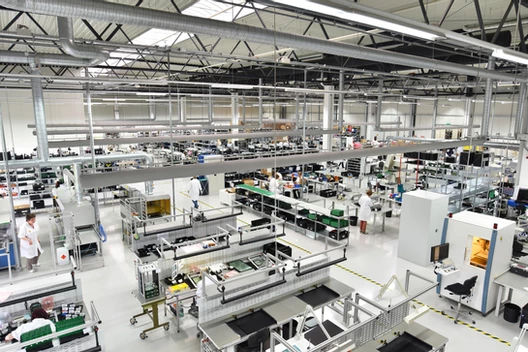- Central Texas is in the running for another exciting corporate expansion. Samsung has proposed building a chip factory that could create 1800 new jobs.
- In exchange, Samsung has asked for more than $1 billion in tax incentives.
- While we DEFINITELY want Samsung to come here, its not clear to me if incentives that large are a good idea.
The last few years have been great for the Central Texas economy. We wrote a little about this when Tesla decided to open a new plant in Austin. They were just the latest of a steady stream of companies that have decided to move operations to our fantastic City.
And now the new hot topic is Samsung. Austin is apparently in the running for Samsung’s new chipmaker factory. One of the deciding factors appears to be whether the City will give Samsung a big tax break.
As I was reading about Samsung’s request, it got me thinking about the tax incentives that cities provide companies to get them to open a new business in those cities. Are they a good idea for cities? Do they have an overall positive effect? That’s what we are going to talk a little about in this week’s article.
Now, before I begin – just so everyone doesn’t get mad at me – I am not some communist. I love companies. I love when they open new businesses and provide new jobs. Capitalism rules. And, if you haven’t been able to tell through this blog, I have some real issues with our City Council. And I’m happy to tell you all about it if you buy me a beer.
But I also think that if we are going to spend a lot of our tax dollars on something, we should know if it works, right? If it is a good idea. So that’s what I want to learn about.
What Samsung May Bring
First lets talk about this potential exciting new development that Samsung is talking about. It is proposing to build a 7 million square foot next generation chip fabrication plant. The plant would create approximately 1800 jobs.
In exchange for building this, Samsung is requesting the following:
- 100% tax abatement over 20 years from Travis County (worth an estimated $718 million);
- 50% tax abatement from Austin over 5 years (worth an estimated $87 million); and
- A Chapter 313 incentive from the Manor school district (worth an estimated $253 million).
Combined, that’s over $1 billion in tax incentives that Samsung is requesting. Undoubtedly this is an opening bargaining position from Samsung. Its unlikely that will be the final number offered. And, as mentioned above, Samsung will allegedly bring 1800 new jobs in exchange for those incentives.
Its easy to see why Cities give incentives. Companies bring jobs and people. And that excites the local economy – people make money, they spend money in the local area, the company and employees pay taxes, etc. Getting a company to move to your city and create jobs is fantastic. That obviously goes without saying. So when a company asks for incentives to create those jobs, its easy to see why a city may agree.
Is this a Good Deal for Central Texas?
But is it a good idea? That’s the big question, right? And I have to admit up front – I have no idea. I am not an economist and I am outside my comfort zone at this point. But that really hasn’t stopped me from opining previously, so why not?
When researching for this article, I Googled. And what I found were a number of articles that said tax incentives are out of control and not a good deal for cities.
It seems like a relatively simple calculation – do the jobs created by the company bring more to the locality than that locality gives up in taxes?
Bloomberg Citylab called incentives worse than useless because, among other reasons, governments hand out the money to companies and then do not follow up to see if the companies are meeting the promises they said they would meet. The Institute for Taxation and Economic Policy called incentives expensive for states and a drag on the nation. Specifically, it found that incentives are:
- Windfall benefits – rarely the deciding factor in whether a company locates to an area;
- Runaway benefits – impossible to design a structure where the locality gets all of the benefit of the company;
- Displacement, not growth – while incentives benefit one company, they do so at a cost to another;
- Neglected alternatives – tax incentives can lead to cuts in needed spending elsewhere; and
- The wrong signal – large tax incentives can harm a locality’s reputation.
Even if all of these things are correct, though, the problem is that other cities are giving/will give companies like Samsung similar incentives. So if Central Texas wants to be competitive with other localities and get Samsung to build here (which we do) – it may have no choice but to give incentives to compete with other municipalities.
Alternatives
But if these studies are correct – and tax incentives are a bad idea – what is a city to do? Like I said, we still want Samsung to come here.
In late 2019, economist Timothy Bartik had some alternative suggestions. He thought cities should:
- Target incentives to distressed areas;
- Cut back on long-term incentives; and
- Cut back on the size of incentives.
As I mentioned above, I’m not an economist. I don’t know if Bartik or the groups above are correct and incentives are generally not worth it. It seems to be the overwhelming economic consensus that this is the case. But, as mentioned above, we want Samsung here. So how do we get these companies to keep coming?
I honestly don’t know. But I hope that doesn’t stop us from asking the tough questions.



